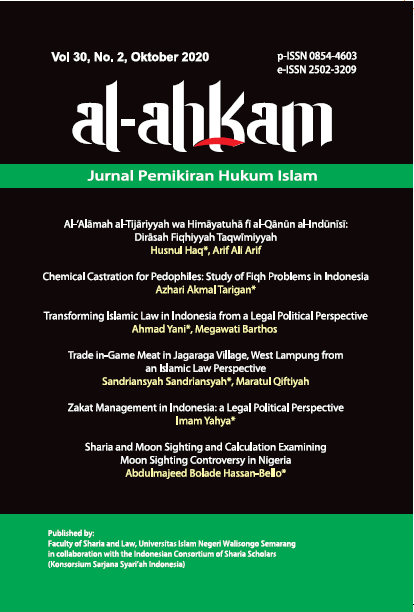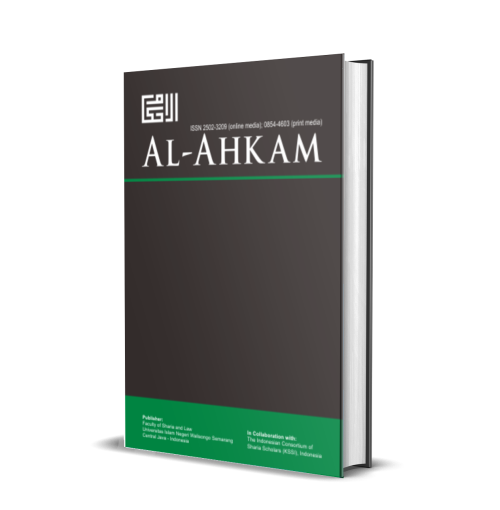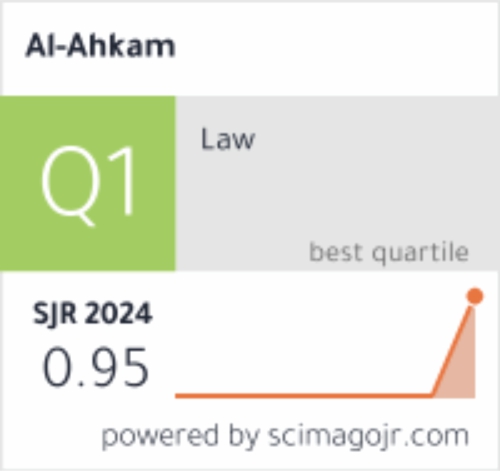Chemical Castration for Pedophiles: Study of Fiqh Problems in Indonesia
DOI:
https://doi.org/10.21580/ahkam.2020.30.2.5517Keywords:
pedophiles, chemical castration, fiqhAbstract
Chemical castration is a punishment against pedophiles, who have committed acts of crime that are considered an extraordinary crime. Pedophiles have ruined the future of children, with tremendous psychological and environmental impacts. This paper aims to uncover the problems of fiqh in Indonesia concerning chemical castration which has the aim of providing a deterrent effect for rape perpetrators of children. The data collection method in this study uses the literature study. There are differences in the views of legal experts with doctors. Legal experts decide on penalties for pedophiles with Law Number. 17 of 2016 concerning the Second Amendment to Law Number. 23 of 2002 concerning Protection of Children, while the Indonesian Doctors Association states reject chemical castration punishment, following the Code of Ethics as stated in the rules of the Medical Code of Ethics Assembly (MKEK) Number. 1 of 2016 concerning Chemical Castration. Fiqh experts disagree over the castration penalty for chemistry. There is no castration punishment in the fiqh, because the Prophet Muhammad forbade castration, as opposed to Islamic principles. Some fiqh experts agree that chemical castration punishment includes ta'zīr, which is a sentence handed over entirely to the legitimate government. Thus, although the castration chemical punishment has been determined, in its implementation there are problems because there are still rejections and problems according to the fiqh expert
Downloads
References
Abdul Wahid and Muhammad Irfan. Protection of Victims of Sexual Violence Advocacy for Women’s Human Rights,. Bandung: Refika Aditama, 2001.
Abdullah, Arif Tio Buqi. ‘Facts of the Aris Predator Case for Children, Sentenced to Chemical Castration Punishment, Asks to Be Sentenced to Death to File a PK’. Tribunnews.com, n.d.
Adam Yuriswanto and Ahmad Mahyani. ‘Castration Law as Additional Crimes in the Criminal Act of Sexual Crimes’. Law Journal of Law 14 (2018): 28–40. https://doi.org/10.5281/zenodo.1188350.28.
Arah.com. ‘MUI Agrees Castration Law For Actors of Sexual Violence’, 2016.
Auda, Jasser. Maqasid Al-Shari’ah as Philosophy of Islamic Law: A Systems Approac. Herndon: The International Institute of Islamic Thought, 2010.
Azizan, Muhammad Fathurrahman bin. ‘Castration Punishment for the Criminals of Pedophilia (Comparative Study of Islamic Law According to Classical Ulama and Perppu Number 1 Year 2018)’. UIN Ar Raniri, 2018.
Beritatagar.id. ‘Pedophiles in Kendari Were Sentenced to 20 Years in Prison’. 8 October 2019, n.d.
Budianto, Enggran Eko. ‘This View Is Castrate Chemistry Problem Ulama in Mojokerto Child Predator’, 2019.
Al-Ghazzālī, Abū Ḥāmid Muḥammad Ibn Muḥammad. Al-Mustaṣfā Min ‘Ilm al-Uṣūl. Madinah: al-Jāmi’ah al-Islāmiyyah, n.d.
Hariyanto. The Socio-Psychological Impact of Victims of Rape Against Women. Yogyakarta: Pusat Studi Wanita Universita Gajah Mada, 1997.
Ilyas, Sufyan. ‘Chemical Castration Sanctions for Pedophiles in the Legal Perspective in Indonesia’. Al Mursalah Journal 1, no. 2 (2015): 54–62.
Indonesia, CNN. ‘Komnas Perempuan: Every Day, 8 Women Are Raped in Indonesia’. CNN Indonesia, n.d.
Jawhar, Aḥmad al-Mursi Ḥusayn. Maqāṣid al-Sharī’ah fi al-Islām, n.d.
Jawa Pos. ‘Police Check the Mental Condition of Bang Jack, Predator 19 Children in Tulungagung’, n.d.
Kompas.com. ‘Chemical Castration for 9 Child Rapists Was Carried out at the End of the Sentence’. Kompas.com, 2019.
Krismiyarsi. ‘Chemical Castration Sanction Policy for Actors of Sexual Violence against Children, Study of Legal Politics’. Unnes 4, no. 1 (2018).
Kristiani, Ni Made Dwi. ‘Sexual Violence Crimes (Rape) Viewed From a Criminological Perspective’. Journal of Magister Hukum Udayana 7, no. 3 (2014).
Ligina, Neng Lani, Ai Mardhiyah, and Ikeu Nurhidayah. ‘The Role of Parents in the Prevention of Sexual Violence against Children in Elementary School in the City of Bandung’. Ejournal UMM 9, no. 2 (2018): 109–18.
M.liputan6.com. ‘PN Mojokerto: Castration Sentence Against Child Rapists with Law’. Surabaya.Liputan6.com, n.d.
M, Ahmad Muntaha A. ‘Fiqh Problem of Chemical Castration’. Jawa Pos, n.d.
Madnur. ‘Castration Sanctions in Indonesia in the Perspective of Islamic Law and Child Protection’. UIN Syarif Hidayatullah, 2019.
Manafe, Imanuel Nicolas. ‘For the First Time in Mojokerto, Judge Sentenced to 9 Child Rapists with Chemical Castration Punishment’. Tribunnews.com, n.d.
Mardiya, Nuzul Qur’aini. ‘Application of Chemical Castration Punishment for Perpetrator of Sexual Violence’. The Constitutional Journal 14, no. 1 (2017): 18.
Mardliya, Nurul Qur’ani. ‘The Application of Castration Punishment for Sexual Violence’. Constitutional Journal 14, no. 1 (2017).
Marzuki, Suparman. Sexual Harassment. Yogyakarta: Faculty of Law Indonesian Islamic University, 1997.
Merdeka.com. ‘Cases of Chemical Castration from Korea to the United States’, n.d.
Merriam-Webster. ‘Pedophiles Abuse 6 Children in Kendari, This Is Why People Become Pedophiles’, n.d.
Nur Hafizal Hasanah and Eko Soponyono. ‘Criminal Law Policy on Chemical Castration Sanctions in the Perspective of Human Rights and Indonesian Criminal Law’. Udayana Magister Law Journal 14, no. 1 (2014).
Nurhayati. Modern Age Slavery: Trafficking in Perspectives of Ulama. Medan: Perdana Publishing, 2016.
Nurliza Fitriyani, Muhammad Hamdan and Mohammad Eka. ‘Chemical Castration Acts for Sexual Crimes against Children According to Islamic Law Enforcement Officials’. Jurnal Usu, n.d.
President of the Republic of Indonesia. Government Regulation in Law of The Republic of Indonesia Number 1 of 2016 Concerning The Second Amendment to Law Number 23 of 2002 Concerning Child Protection (2016).
Qudāmah, Ibn. Rawḍah al-Nāẓir wa Jannah al-Manāẓir fī Uṣūl al-Fiqh . Riyad: Maktabah al-Rushd, 1993.
Rachmawati, Evy. ‘The Dark Side of Tourism on the Island of the Gods’, n.d.
Ratnasari, Melina Dwi. ‘The Views of Nahdlatul Ulama and Muhammadiyah of East Java on the Implementation of Castration Penalty Sanctions on Pedophilia Actors Based on Law Number 17 Year 2016 and According to Islamic Law’. UIN Sunan Ampel, 2018.
Rosyid, Maskur. Implementasi Konsep Maslahat al-Ṭūfī dalam Fatwa MUI (2005-2010). 1st ed. Magelang: Ngudi Ilmu, 2013.
Al-Shāṭibī, Abū Isḥāq Ibrāhīm bin Mūsā Bin Muḥammad. Al-Muwāfaqāt fī Uṣūl Al-Sharī‘ah. Arab Saudi: Dār Ibn ‘Affān, 1997.
Siradj, Said Aqiel. Islam Kebangsaan Fiqh Demokratik Kaum Santri. Jakarta: Pustaka Ciganjur, 1999.
Sukardi, Muhammad. ‘The Case of Teacher Rapes 34 Students in Bandung, Is It True That Left-Handed Men Tend to Be Pedophiles’, n.d.
Sutriyanto, Eko. ‘The Case of Pedophilia Occurred in Medan, the Perpetrator Was Unexpectedly, the Victim’s Own Neighbor’. 22 January 2019, n.d.
Syam, Nur. Madzab-Madzab Antropologi. Yogyakarta: LKiS, 2007.
Tirto.id. ‘KPAI Highlights Cases of Sexual Violence against Children in East Java during 2018’. tirto.id, n.d.
Tribunnews.com. ‘The First Chemical Castration Penalty For Child Rapists Cannot Be Implemented Without Technical Instructions’. Tribunnews.com, n.d.
Weda, Made Darma. Criminology. Jakarta: Raja Grafindo Persada, 1996.
Downloads
Published
How to Cite
Issue
Section
License
By submitting an article to the journal, the author(s) agree to transfer the published article's copyright to the journal, which will act as the publisher. This means the journal will have the right to publish the article in various forms, including reprints. The journal will maintain the publishing rights to the published articles.
In line with the license, authors and third parties (readers, researchers, and others) are allowed to share and adapt the material. In addition, the material must be given appropriate credit, provided with a link to the license, and indicated if changes were made. If authors remix, transform or build upon the material, authors must distribute their contributions under the same license as the original.




